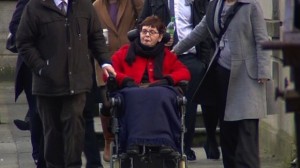The Supreme Court has begun hearing an appeal by Donegal woman Marie Fleming against the refusal of the High Court to relax the absolute ban on assisted suicide.
In January, the High Court ruled against the 59-year-old, who took a landmark case challenging the law on assisted suicide.
Lifford woman Ms Fleming, who has multiple sclerosis, wants an order declaring the ban on assisted suicide declared invalid under the Constitution and incompatible with the European Convention on Human Rights.
However, the High Court said while her rights were affected by the ban it could not agree the legislation was disproportionate.
The court agreed personal autonomy, especially in medical matters, was a core Constitutional value affected by a ban on assisted suicide, but said it could not agree that it was a disproportionate interference with this right.
Opening the case this morning, senior counsel Brian Murray said it would be his submission that the High Court was wrong in this decision.
Mr Murray outlined Ms Fleming’s condition to the court and said she was in constant pain and distress and suffered indignity.
He said she did not seek to have another person kill her, but she wished to and could take that step herself but needed assistance to do so.
Mr Murray said she was unable to take a course of action open to an able-bodied person.
He said the court would be asked to decide if the ban on assisted suicide impaired Ms Fleming’s rights under the Constitution and the European Convention on Human Rights.
If so, the court would be asked to decide was it justified in doing so in the public interest and if it was proportionate.
Mr Murray said the court would also be asked to decide if there was a discrimination between Ms Fleming and an able-bodied person who can take their own life.
He said she has a right to a dignified death and to choose the manner and timing of that death.
Mr Murray said the cruel irony was, were she able bodied and not experiencing the same acute degree of suffering, she would be able to do what she now wants to do.
The appeal is expected to last three days.
Tags:






